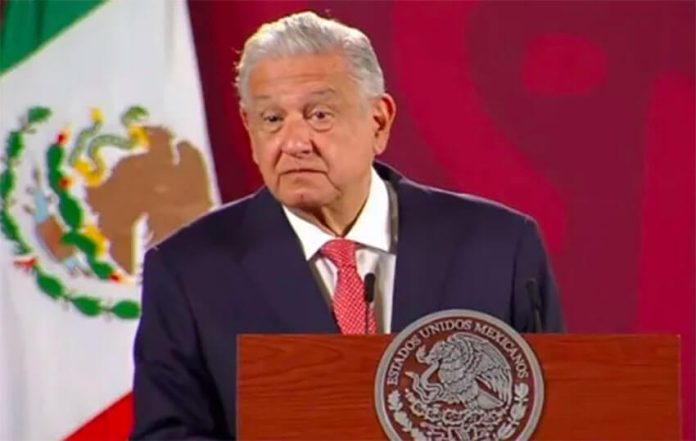President López Obrador on Tuesday announced a plan to dismantle the National Electoral Institute (INE) in its current form, triggering criticism from electoral experts and opposition parties.
At his regular news conference, López Obrador – an outspoken critic of the INE – said he would send a constitutional bill to Congress that would allow citizens to directly elect electoral councilors and electoral tribune judges.
He said his proposed reform would “guarantee democracy in Mexico” and ensure that there are no judges with “biased attitudes” on electoral matters.
“This is so that there are no councilors or judges that don’t have a democratic vocation. And also to guarantee a free and secret vote, so there are no electoral frauds,” López Obrador said.
The president claims that fraud was the reason he didn’t win the 2006 and 2012 presidential elections, at which he was runner up to Felipe Calderón and Enrique Peña Nieto, respectively.
“We reached the presidency after fighting for many years and suffering electoral frauds, so we have to leave democracy strengthened,” López Obrador said.
“We’re going to present this initiative and we’re going to do it with the participation of all the people. It will go to the Chamber of Deputies first,” he said, adding that citizens would be given the opportunity to elect councilors and judges via an open vote in “a direct way.”
“The top-down agreements that are contrary to the interests of the people are over, or I hope that they end,” López Obrador said.
He said the executive, legislative and judicial branches of government would each nominate about 20 honest, “truly independent” candidates to fill the electoral councilor and electoral judge positions for a total of 60 candidates in each category.
The objective would be to have male and female councilors and judges in equal numbers, López Obrador said.
If the proposed reform becomes law and electoral officials are elected by citizens, Mexico will become the first country in the world to have such a system, the newspaper Reforma reported.
Luis Carlos Ugalde, a former president of the Federal Electoral Institute (IFE), the INE’s predecessor, said he wondered if López Obrador might be joking and contended that it would never pass Congress given that constitutional bills require the support of two-thirds of lawmakers to become law.
He also questioned what merit the elected individuals would have. “What kind of electoral authorities will come from this kind of exercise? It will give access to anyone and break the padlocks of experience and merit,” he said.
Ugalde also contended that those elected would serve the interests of the current federal government and the ruling Morena party, which together form the so-called Fourth Transformation or 4T movement.
The government has held several popular votes since it took office and has achieved the outcomes it sought largely because its supporters turned out in larger numbers than other members of the electorate. The opposition has called for boycotts of such votes, including a referendum last August in which citizens were asked whether past presidents should be investigated for crimes they might have committed while in office.
Electoral councilors and electoral tribunal judges elected in a popular vote would be “captured by an ideology, by the 4T,” Ugalde said. “They will be elected by the people but at the service of an ideology.”
Leonardo Valdés, another former IFE president, said that “experience tells us that it’s a terrible idea to reform the electoral system prior to an election.”
“So I would describe this idea as a terrible idea – a wrong idea at the wrong time,” he said.
Valdés, now an academic at the Meritorious Autonomous University of Puebla, noted that Morena and its allies would need opposition party support to approve the reform.
But Senator Clemente Castañeda, leader of the Citizens Movement party in the upper house, asserted that the bill “wouldn’t pass under any circumstance.”
“We call on the president to get serious and attend to the country’s problems,” he said.
Other opposition lawmakers, including representatives of the National Action Party (PAN) and the Institutional Revolutionary Party (PRI), also indicated that they wouldn’t support the proposal.
Senator Julen Rementería, the PAN’s leader in the upper house, said his party won’t allow the destruction of Mexico’s election authorities.
“We have to respect the INE, strengthen the INE, and not, as he proposes, … destroy it, demolish it [or] simply not recognize it,” Rementería said.
“… The truth is that the announcement of this initiative shows the desperation and desire … [López Obrador] has to destroy the electoral umpire – the National Electoral Institute, and of course the [Federal] Electoral Tribunal.”
PRI Senator Mario Zamora asserted that no Mexican wants to take a backward step in terms of democracy building. He said López Obrador’s proposal may have been another improvised, fanciful “quip” of the kind he has previously made in his morning press conferences, but the president repeated his proposal on Wednesday.
In recent times, López Obrador has accused the INE of not sufficiently promoting the upcoming “revocation of mandate,” or recall, vote, a claim the institute’s president, Lorenzo Córdova, has rejected
The president and the INE chief have clashed on several occasions, including after the former said in 2020 that he would be a “guardian” of the 2021 midterm elections.
Córdova said in February that the federal government was seeking to undermine the autonomy of the INE by cutting its budget, while he claimed in 2020 that the institute was facing unprecedented hostility – antagonism that could result in its death, or at least a complete overhaul, if AMLO gets his way.
